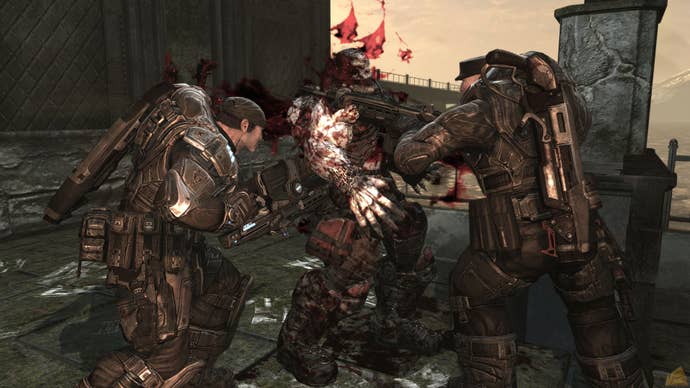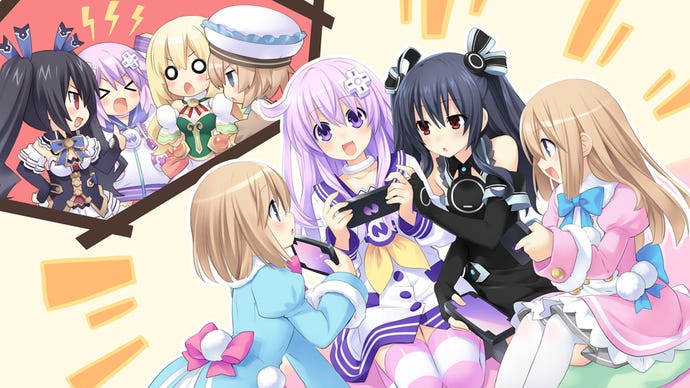On Not Being One of the "Cool Kids"
Ever felt your tastes were just slightly out of step with everyone else? Pete certainly has. Embrace your weird and wonderful tastes -- it makes conversations about gaming more interesting for everyone!
This article first appeared on USgamer, a partner publication of VG247. Some content, such as this article, has been migrated to VG247 for posterity after USgamer's closure - but it has not been edited or further vetted by the VG247 team.
I've always been something of a misfit, and I came to terms with the fact that I wasn't one of the "cool kids" pretty early on in my life.
I had (well, have) unruly hair that refused to be styled in any way, I played a classical-centric musical instrument (which is cool when you're older, but not when you're at school), and I was the only one in my primary school class who hadn't seen what was then the only two Terminator movies. The latter one probably says more about differing attitudes to parenting between families than anything else, but the fact I didn't know what anyone was talking about when they started quoting Arnie one-liners meant that it was somewhat difficult to join in with popular conversation topics. (I got quite good at faking it after a while, though.)
And then, of course, I was into computer games. As unthinkable as it might seem these days, what with the mainstream popularity of series like Call of Duty, EA Sports' various series and even free-to-play stuff like League of Legends, computer and video games were once very much a niche interest, beloved of the more geeky among us and derided by those who would rather go outside into a muddy field and kick a ball around.

I was never ashamed of my chosen hobby, though, and this, I feel, was an important and defining characteristic of what made me the person I am today. Through my love of computer and console games, I made a number of lifelong friends, and continued to do so as the years passed. This circle of friends only continued to widen as the Internet came on the scene and made communicating with people in far-flung corners of the globe a simple matter. We shared a common interest; a common passion. That drew us together, particularly due to the fact that, at one point or another, we had all dealt with those sidelong glances (or, in rare cases, outright abuse) from people who didn't really understand why we were looking at pixelated people shooting pixelated aliens for significant proportions of our days.
Today, as I've already alluded to, gaming is a much more mainstream form of entertainment. Millions of people engage in virtual combat against one another in Call of Duty; millions more play virtual football and soccer matches; yet millions more team up against one another in complicated action-strategy games that I'm not sure I'll ever understand.
But I'm still a misfit.

The reason for this is that as gaming has grown in "acceptability" (for want of a better term) in society at large, it has also grown in breadth. Whereas once it was a relatively simple matter to stay on top of all the "essential purchase" games for your platform(s) of choice, today it's impossible to stay on top of the seemingly endless churn of triple-A, let alone investigate anything perceived to be lower-tier.
This means that today's gamers have to make some tough choices. Do they resolutely follow the well-worn path of triple-A, jumping on every big-budget extravaganza they can and joining the already-loud chorus of voices proudly proclaiming each new thing the "best thing ever?" Do they completely eschew triple-A altogether and immerse themselves in the often strange and quirky world of independently-developed titles? Do they follow the "mid-tier" games out there, enjoying creative but flawed experiences that could perhaps benefit from a slightly bigger budget or a little more development time?
You don't have to choose a single path, of course; deliberately blocking off a complete sector of the entertainment medium you enjoy is rather silly, after all. But it pays to set a few limits on yourself, particularly if you start feeling obliged to play things rather than wanting to.
I remember the exact moment I drifted off the mainstream path and started to really embrace my misfit nature when it came to games.

It was shortly after the release of Gears of War. I hadn't owned my Xbox 360 for very long, and I was still playing on a 4:3 aspect ratio CRT standard-definition television. I'd picked up a copy of Gears because my friends had been raving about it, and it was the "big game" at the time. I wasn't sure I wanted to play it, but I felt like I should.
It was testament to Gears' then-impressive visuals that it still looked simply incredible on that crappy old TV, even letterboxed into fake 16:9 480i resolution. I played through probably half of the Gears campaign, marvelling at how the graphics looked way better than the prerendered cutscenes that used to be all the rage in mid-'90s PC games.
There was just one problem. I wasn't enjoying myself at all. Or, to put it more accurately, I wasn't deriving any sort of satisfaction from the experience.
I'm a strong believer in the argument that games don't have to be "fun" or "enjoyable" to be successful as pieces of entertainment, as emotionally-harrowing games like The Walking Dead and To The Moon will attest; not all movies are comedies, after all. But Gears of War just wasn't pushing any of my buttons: I didn't give a damn about the characters, I couldn't tell you what the story was, the gunplay against the bullet-sponge enemies was frustrating, and the fact that these big, burly, armored men could be taken down by a single sniper shot to their inexplicably unarmored head was proving utterly infuriating, particularly when said repeated sniper-related deaths meant I had to hear the same piece of dialogue over and over and over again.
"There's a sniper up there!" they'd yell. "I know," I'd growl, through gritted teeth.

It was around that point that I took out Gears of War from my 360, took it back to the shop and traded it in. I can't remember what for, but the miserable experience I had with it put me off that series for life; I never even contemplated touching 2, 3 or Judgement. I had similar experiences with the Halo series, too. I must confess to having had a bit of fun with Reach, but this was more due to the fact that it gave me the regular opportunity to play online with a woman I was rather enamored with at the time rather than actually enjoying the game as such; if you asked me today what happened in Reach's campaign, I don't think I'd be able to tell you.
Annualized franchises didn't help, either. I was one of the few people who really, really liked the concept of Assassin's Creed's futuristic meta-plot when it was first revealed, for example, but found the first game to be too dull in execution to hold my interest. By the time the second came out, I was already playing something else; by the time Brotherhood came out, I was well behind; by the time Revelations came out, I had lost interest in the series altogether because it felt like I'd never catch up. Now, I'm not even entertaining the thought of trying III or IV; I have no real place for that series in my life, regardless of how good it is.
In my free time today, I will deliberately seek out experiences that I know are to my own personal tastes. These experiences don't necessarily match up with critical acclaim or commercial success, but I've found my niches and I love them: Japanese visual novels and dating sims; colorful Japanese role-playing games; independently-developed titles that combine retro visuals with modern gameplay; bullet hell shmups; roguelikes.

I don't expect everyone to enjoy the same things that I do, but I really love the fact that my tastes are well catered to in today's market, while at the same time someone who adores Battlefield, or Assassin's Creed, or any other triple-A franchise you'd care to mention, can still derive great satisfaction from what is ostensibly the same creative medium.
And you know what? The fact that my experiences with gaming can be completely different from someone who exclusively plays blockbuster games makes for great conversations. I have a friend who plays nothing but Minecraft and Skyrim, for example, but he's always fascinated to hear about the strange subject matter that Japanese games often tackle, or the odd things that indie developers are up to. Similarly, I have another friend who is massively into hardcore strategy games; I know from bitter, bitter experience that I simply don't have the right kind of brain for this type of experience, but it's always utterly fascinating to hear about his latest dynasty in Crusader Kings 2, or his wars on the Eastern Front, or how he changed the course of historical battles.
Gaming has never been as diverse as it is today, and with the introduction of the next generation of consoles, developers will have even more flexibility to provide us with an even more tremendous breadth of experience than they do now. I for one can't wait to see what treats the developers from a little off the beaten path will bring us in the coming years.
